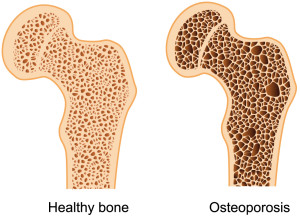
Osteoporosis is when your bones become weak and make it more likely for you to break a bone (a fracture). It can occur due to specific diseases or due to aging and loss of estrogen. Some people inherit the tendency to develop osteoporosis. You can have serious problems if you break a bone, especially a hip bone, such as pneumonia or the inability to walk. Many people who break bones due to osteoporosis end up needing help and need to live in a nursing home.
Osteoporosis does not give you symptoms until you break a bone, so your doctor may order a bone density test (often called a DEXA) to see if you may be at increased risk for fractures. If your bone density is low, additional tests will be recommended to look for why your bone density is low and to help decide how to treat you. Sometimes you may not have enough calcium or vitamin D. It could also be an abnormality in your parathyroid gland or you could be losing too much calcium in your urine.
Treatments for osteoporosis can be related to a specific abnormality that has been found, or may be a general treatment to increase your bone density. The most common general treatment is a bisphosphonate which decreases the breakdown of bone. There are other medications that decrease the breakdown of bone and some that increase the production of bone.
Whether you have osteoporosis or are trying to avoid getting it, you should get enough calcium, vitamin D and exercise. You also want to avoid falls by doing simple things like making sure you wear the right shoes, have good lighting in your home and don’t have loose rugs or cords you can trip on in your home.
If you would like more information you can look at some of these websites:
National Osteoporosis Foundation
American College of Obstetricians and Gynecologists

